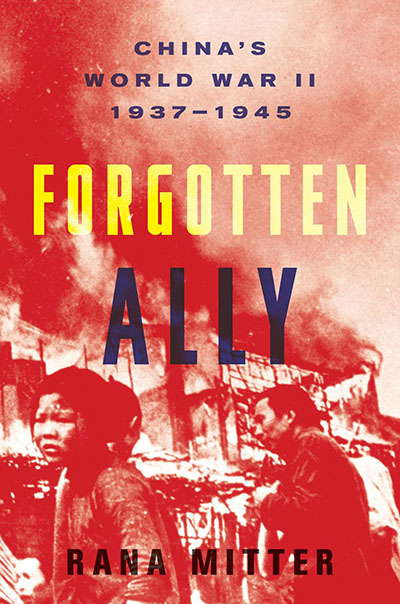
Forgotten Ally
China’s World War II, 1937–1945
by Rana Mitter. 464 pp.
Houghton Mifflin Harcourt, 2013. $30.
Reviewed by Ronald Spector
FOR EUROPE, WORLD WAR II BEGAN in 1939 and for America 1941. But for China it started in 1937. Their war claimed about 15 million Chinese lives, devastated some of China’s largest cities, destroyed much of its infrastructure, and generated some 80 million refugees. From 1937 to 1941, as China fought alone against Japan, it suffered catastrophic defeats, the loss of its capital, all of its port cities, and much of its best arable land.
Despite this, China’s bloody eight-year struggle plays almost no role in the continuing American fascination with World War II. The only popular American book on the subject, Barbara Tuchman’s Stilwell and the American Experience in China, 1911–1945, published in 1971, presented a picture of wartime China under Chiang Kai-shek as a corrupt and dysfunctional society that contributed little to the defeat of Japan while demanding much from the Allies. Tuchman portrayed Chiang as an incompetent, stubborn, self-serving dictator, who habitually ignored good advice and was preoccupied with preserving his army for the really important postwar struggle to come—with Mao Zedong’s Chinese communists.
In Forgotten Ally, Rana Mitter, the distinguished Oxford historian of East Asia, focuses properly on China’s wartime experiences, making clear the price it paid in its fight for survival before the United States and Britain entered the war and after. In clear and compelling prose, Mitter covers the Nanjing Massacre, the Henan famine, the ordeal of refugees, the dilemmas of collaboration, and the plight of Chiang’s wartime capital, Chungking, probably the most bombed Allied city in Asia. If this fine book has one shortcoming, it is the author’s lack of familiarity with the larger picture concerning World War II strategy and military operations. While it can be fairly argued that the British and Americans failed to understand China, it might also be argued that Mitter fails to understand British and American strategy. He has used few if any primary documents on that subject and indeed appears unaware that U.S. strategy was, at the highest levels, the responsibility of the Joint Chiefs of Staff and not simply formulated by Army Chief of Staff General George C. Marshall. Similarly, while many of Mitter’s criticisms of General Joseph Stilwell, Chiang’s abrasive American military adviser and nominal chief of staff, are justified, he fails to understand Stilwell’s concern with reopening China’s line of supply to the Allies and instead attributes all of Stilwell’s actions to animus for Chiang and other personal obsessions.
Ronald Spector, a professor at George Washington University, is an MHQ contributor and author, most recently, of In the Ruins of Empire: The Japanese Surrender and the Battle for Postwar Asia.

.jpg)



